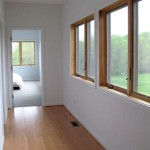Rediscovering the Essence of Interior Architectural Design
Interior architectural design is an integral discipline that shapes the spaces we inhabit, influencing our well-being, productivity, and overall experience. As we navigate the complexities of modern living, it becomes imperative to understand the fundamental aspects that define this field.
1. Spatial Planning and Proportion
Spacial planning involves the judicious allocation of space within a given area. Designers utilize a combination of measurements, scale, and perspective to create functional and aesthetically pleasing environments. Proportion refers to the relationship between the sizes and shapes of different elements within a space, ensuring a balanced and harmonious aesthetic.
2. Materiality and Color Theory
The selection of materials and colors is crucial in establishing the ambiance and functionality of a space. Materials like wood, stone, and glass possess distinct textures and properties that contribute to the overall atmosphere. Color theory encompasses the principles of hue, saturation, and value, assisting designers in creating cohesive color palettes that evoke emotions and influence the perception of space.
3. Lighting and Acoustics
Lighting plays a pivotal role in shaping the character of a space. Natural light can be harnessed to create airy and inviting environments, while artificial lighting can enhance functionality and create dramatic effects. Acoustics, on the other hand, addresses the sound quality within a space, ensuring that conversations can be conducted clearly and that noise levels are maintained within acceptable ranges.
4. Sustainable and Biophilic Design
Sustainability has become a key consideration in interior design. Designers seek to minimize the environmental impact of their work by incorporating eco-friendly materials, reducing energy consumption, and maximizing daylighting. Biophilic design, inspired by nature, brings the outdoors in, fostering a connection to the natural world and promoting well-being.
5. User-Centered Approach
Interior architectural design is ultimately about creating environments that meet the needs and aspirations of the occupants. Designers engage in comprehensive user research, understanding their lifestyle, preferences, and functional requirements. This user-centered approach ensures that spaces are tailored to the specific individuals who will inhabit them.
Conclusion
Interior architectural design encompasses a multifaceted array of concepts and principles. By mastering these essential aspects, architects and designers can create spaces that not only meet functional requirements but also enhance the experience of those who dwell within them. Embracing a holistic approach that integrates aesthetics, functionality, and sustainability, interior architectural design continues to shape the future of human environments.

Trends Arches Curves Interiors By Sarah Langtry

Arches In Interior Design 26 Projects That Reimagine The Classical Shape Archdaily

Arch Design 75 Photos Arches For Home Interior Decoration In 2024

The Front Page Of Internet House Design Arch Designs For Hall Ceiling

Hall Arch Designs For Your Home Décor Beautiful Homes

10 Latest Simple Hallway Arch Designs For Hall Decor Livspace

Home Decor Arch Design Architectural Digest

15 Best Hall Arch Designs To Deck Up Your House In 2024 Archways Homes Interior Design Home

Aluminium Wall Panel At Rs 750 Sq Ft Aluminum Composite Panels In M Id 25126606088

Arches In Interior Design 26 Projects That Reimagine The Classical Shape Archdaily








